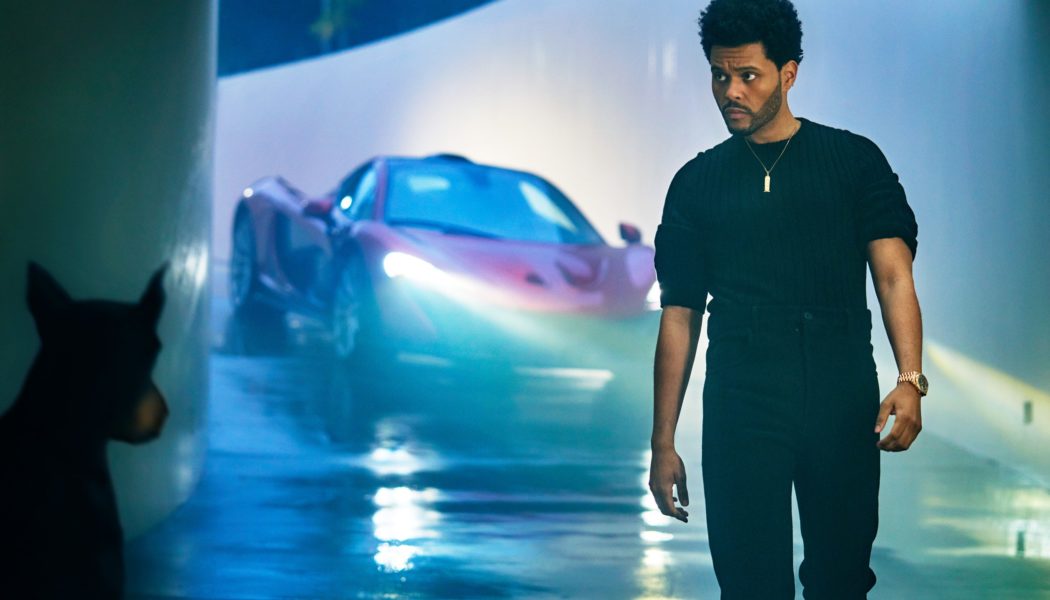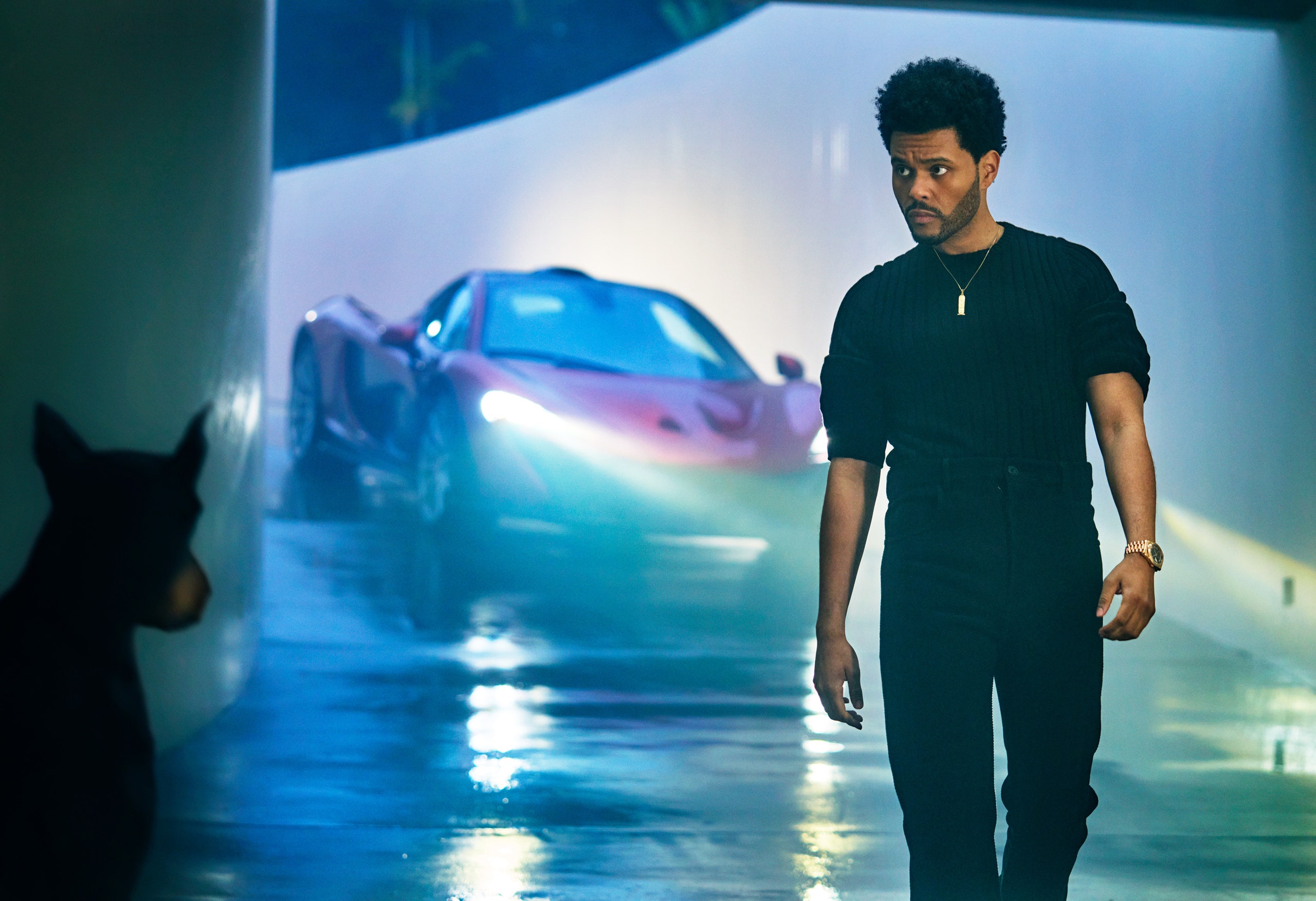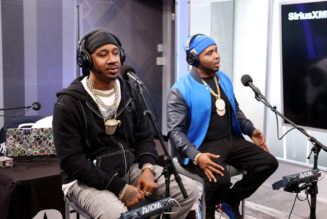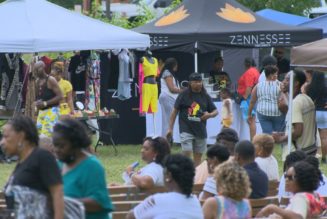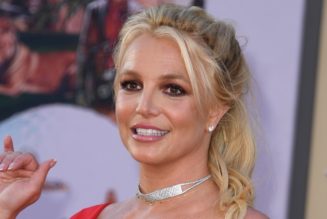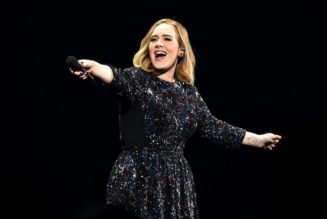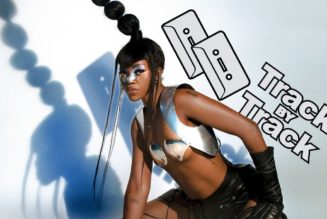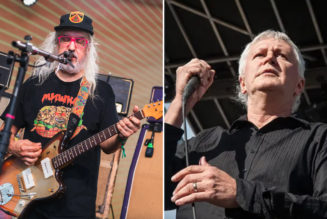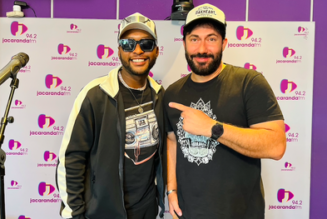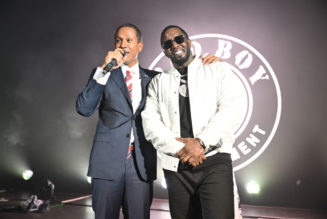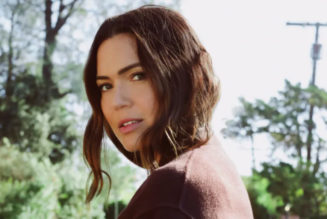On the night of the Oscars in March, Abel Tesfaye had The Larry Sanders Show on in his kitchen.
He’s been watching a lot of ’90s TV, he explained in a quick patter as he walked across the tennis court in his Bel-Air backyard: The Ben Stiller Show and then Mr. Show and then, diving further into Bob Odenkirk’s early career, Larry Sanders.
“Which has become my favorite TV show now,” he said. “It is fucking brilliant.”
He kept picking up steam. “It’s groundbreaking,” Tesfaye went on. “It’s like the birth of that behind-the-scenes meta comedy type, like The Office and Arrested Development and all that, where it feels like it’s blurred between what’s real, what’s not.”
It’s an appealing framing device for Tesfaye, and one he’s turned to himself as he’s become one of a handful of monoculture-style pop stars left. In 2010, when he began anonymously releasing music as The Weeknd on YouTube, Tesfaye developed a cult of personality around his self-obfuscation, partly out of necessity. His tendency toward grandeur, evident early on, belied his station. As the lore goes, he dropped out of his Toronto high school, dragged his mattress out of his mother’s apartment, and held a job folding T-shirts at American Apparel while a post on the blog for Drake’s label stoked his initial hype. Within a few years he was seeking full-on global pop success, and it led him to a string of number one hits, stadium tours, and a Super Bowl performance. In all cases, he has turned his primary subjects—shame, dissolution, seduction—over and over, fusing glitter and chaos. The grinning, wounded villain of Tesfaye’s songs is a heavily compromised figure but not a half-hearted one.
Tesfaye has long suggested, through noirish tropes and frequent references to film, that he had interests in another medium. In March, following The Weeknd’s decade-long and somewhat surreal rise to the loftiest echelon of pop, he was preparing for another devoted swerve. The Idol, the upcoming show Tesfaye made with the filmmaker Sam Levinson and his producing partner and longtime friend Reza Fahim, in which he plays a rat-tailed Los Angeles nightlife showman steering a young pop singer (Lily-Rose Depp), will premiere at the Cannes Film Festival in May and join HBO’s vaunted Sunday night lineup starting in June. The cast includes an array of rising young actors and musicians, and the show, unseen except for a few teasers released over the last year, has already attracted a steady drumbeat of press (almost uniformly skeptical or worse, but attention all the same).
In Levinson, Tesfaye has paired himself with the creator of the HBO show Euphoria, another popular vehicle for glossy disrepair. On Oscar night, Levinson was getting ready for an after-party while his collaborator was a few miles away watching Larry Sanders in sweatpants, Nike slides and Dri-FIT socks, and a trucker hat.
“Who got nominated?” Tesfaye asked on the tennis court. (Cate Blanchett, among others.) “Oh my God.” His eyes grew wide. “Tár was incredible. She crushed Tár. Crushed it.”
In his music, Tesfaye exults in frailty. He’s calmly ruined. “I’ve always had to bet on myself,” he said. “Even before I was The Weeknd, just in life. As soon as I got out of my mother’s womb, it’s been, ‘Bet on yourself. It’s not gonna be easy, you know?’ And I’m fine with that.”
And yet, sinking into a couch in his cavernous living room, he acknowledged some apprehension about this next career leap. “It’s nerve-racking,” he said. We were looking out onto the backyard, where an early evening fog draped over an infinity pool and cabana area. In one set of these seats, Tesfaye and Levinson wrote together after Levinson temporarily moved in. Much of the home is visible over the course of The Idol. As they readied Tesfaye’s television debut, they decided to shoot it there.
At the Super Bowl a couple of years ago, Tesfaye performed his hits: glistening songs that threaten to conceal the desperation and degradation at their core. He also played a sample of “Happy House,” the 1980 song by British post-punk band Siouxsie and the Banshees, which is doubtful about the possibility of domestic joy.
The gesture invoked Tesfaye’s earliest music and drew a line from that work to his current stature. In 2011, the title track of The Weeknd’s debut mixtape, House of Balloons, turned “Happy House” a few shades more sinister. “Been on another level since you came, no more pain”; “You’re in my world now, you can stay”; “If it hurts to breathe, open a window / Oh your mind wants to leave, but you can’t go”; “So don’t blame it on me that you didn’t call your home / So don’t blame it on me girl, ’cause you wanted to have fun.”
This was the thrust of Tesfaye’s introduction to the world, an unrelentingly bleak view of the romantic psyche delivered from nowhere. At the time, he rarely showed his face. His first three mixtapes, all released before he ever gave an interview, were shattering and bruised. They revolved around sex, drugs, control, and their fraught intersections. His voice, a delicate mixture of far more honey than venom, put a slight, unnerving shine on the scuzz. The murky R&B never amounted to a cautionary tale, but as captivating as it was, it tended to leave you feeling as empty and numb as it seemed to leave its author.
Tesfaye is in the midst of some renovations of the home overlooking the Bel-Air Country Club that he bought for $69 million in 2021. He estimated that he’s spent about four months there since he moved in, but he’s gotten to know his neighbor, sushi chef and restaurateur Nobu Matsuhisa, a “sweet, sweet guy.” He’s thinking of turning the tennis court into a basketball court and plans to swap a basement-level screening room for a spa. Near it stands one of the artist Hajime Sorayama’s trademark erotic robots.
Tesfaye was relaxed but animated, quick to pull up a reference or Wikipedia page on his phone or to double back to clarify something he’d said a few minutes prior. He’s comfortable with himself and his status. “There’s something about having incredible weather all the time,” he said. He misses Christmas on the East Coast but has references for the holiday in Los Angeles: Lethal Weapon, Less Than Zero.
Growing up in Scarborough, a quiet district of Toronto, Tesfaye had an easy charisma, a spongelike enthusiasm for art, music, and film, and a knack for impersonating voices. La Mar Taylor, his high school friend and longtime creative director, recalled how they bonded over their shared backgrounds and interests. Tesfaye’s parents had come to Canada from Ethiopia amid civil war, and he grew up in a small apartment with his mother and grandmother after his father left. Taylor also had a single mother. The Black students at their school, he said, mostly lived in government housing and “had that background of just being street-intertwined and street-related.” He and Tesfaye both loved underground music and cartoons and shared a variety of artistic pursuits, with Taylor gravitating toward photography and videography. Tesfaye had always wanted to be a filmmaker. “The first antihero that I fucking fell in love with was Scarface,” he said, savvy enough to note the cliché. Toward the end of high school, he hit on a more immediate talent.
“I found out that I could sing,” Tesfaye said, “and I’m like, Oh, maybe that’s the ticket.”
As hazy as the early mixtapes were, they were also fully formed. Taylor said that Tesfaye had demonstrated vision from the beginning of their relationship. “We were going downtown a lot,” he said, “and it came to the point where we just wanted to be downtown all the time.” Taylor had a few more credits left to finish school when, as he remembers it, Tesfaye said to him, “Fuck dude, let’s just drop out.”
They surrounded themselves with skateboarders and graffiti artists and delved further into drugs, eventually moving into the residence that came to be memorialized as House of Balloons. “All the lyrics Abel was saying in those songs,” Taylor said, “that was the backdrop of our lives.”
At that point, any notion of pop fame would have been far-fetched. I asked Taylor if he had a theory as to why Tesfaye’s music has been able to scale as it has. “The whole universe The Weeknd built was something that a lot of people were going through, consciously, subconsciously,” he said. “The drugs, the sex, the breakup, the heartbreak, the agony after rejection, falling out of love, all those things people go through on a day-to-day basis.”
I’ve always felt like if anybody else that was much more famous sang those songs,” Tesfaye said on his couch, “they’d be number one.” In 2014, he began testing that theory by working with the Swedish super-producer Max Martin, hitmaker for Britney Spears and Katy Perry. He kept the louche motifs but reconfigured their presentation and committed to a new notion of stardom, almost to the point of parody, by working in quarters that Marilyn Monroe once occupied. (Martin was using Frank Sinatra’s old home as a recording compound.) The gambit presented an open question. “Can the Weeknd Turn Himself Into the Biggest Pop Star in the World?” a New York Times Magazine profile asked in 2015. The matter resolved itself. Beauty Behind the Madness, the first album he released with Martin that year, “was like my answer to the naysayers saying he can’t make it,” Tesfaye said. He had lost some of his reticence, and some of the mystery that fueled his initial allure, but found further-reaching pathways. He swapped a dim, detailed view of rancorous sex for bright metaphors of lovelessness. This tempered version of The Weeknd’s early moral decay is, in 2023, the stuff of TikTok trends, grocery store PAs, and office cafeterias.
“My music was very cult-y in the beginning,” Tesfaye said. “And then it ended up bleeding into the mainstream, which then became the sound of mainstream.”
After playing with anonymity, he veered, in the second iteration of The Weeknd, to spectacle. At the Super Bowl, with nearly 100 million Americans watching, he wore the same red suit he had donned for the duration of the promotional cycle leading up to it, sometimes with stage wounds and bandages so as to more literally embody his bloodied glee. There’s now more polish and tranquility, but he’s often working in the same after-hours vein. “I do love a dark story, whether it’s Greek mythology, whether it’s Shakespearean tragedy, whether it’s a fucking Chan-wook Park film,” Tesfaye said. “I enjoy what it makes me feel. It makes me react.”
Given those interests, the music of the ’80s continues to enthrall him. “It was hiding what it was saying through all these beautiful melodies,” Tesfaye said, and recalled a line that his character Tedros says in a trailer for The Idol: “Pop music is the ultimate Trojan horse.”
Not all of Tesfaye’s songs are purely nihilistic. There are the ballads—his 2016 song “Die for You” recently and strangely went to number one after it caught on on TikTok and he released a remix with Ariana Grande—and there are the periodic states of the union, songs where he sizes up his own trajectory. He issued perhaps his most defining statement of purpose, “Reminder,” in 2016. The year prior, he had cemented his place in pop with his first number one hit, the ecstatic, Nickelodeon-approved “Can’t Feel My Face,” and now offered a gentle clarification in his sweet voice: “I just won a new award for a kids show / Talkin’ ’bout a face numbin’ off a bag of blow / I’m like, Goddamn bitch, I am not a Teen Choice.”
Tesfaye’s king Doberman, Caesar, was becoming agitated; his owner pacified him with a chew toy and, as we spoke, he fell into a slumber. “Everyone’s like, Oh shit, you’re actually a fucking nice guy,” Tesfaye told me. “And that makes me feel good.” He has taken occasional pains to mark delineations between person and persona, although for the most part, he hasn’t had to. While he described playing the villain as “the responsibility I need to take,” he has rarely occupied that role as a celebrity presence. He’s not obscure, exactly; his relationships play out as tabloid sagas, his lyrics have a searing intensity, his last album included contributions from Jim Carrey and Quincy Jones. But he’s remained fairly indecipherable, if not blank. The pop became so pristine as to be impenetrable.
In lieu of accessibility, Tesfaye has succeeded through a self-contained world of his own making. It has grown larger and larger while remaining isolated. “Nobody’s outdancing and outsinging Beyoncé,” he said. “There’s a lot of musicians that are not as famous that can fucking outdance and outsing me for sure. But they can’t do what I do as The Weeknd.”
The force of his early aesthetic meant that he could repurpose its chilly, fluttering discontent even as he sanded down its viler aspects in service of a more broadly palatable idea. The Weeknd, in his contemporary form, manages to growl and shimmer, and he plays his songs as part of a sweeping character act. The approach gave him versatility even as he burrowed into his own mythology.
“It’s like the Muppets,” Tesfaye said, nearly giddy with laughter. “Muppets go to space, Muppets go to New York.”
He now occupies a slippery place among his mononym-level peers. On the short list of full-fledged stars in a fractured pop landscape, Tesfaye reaches similar commercial heights with little of the same wide cultural hold. He has been very famous for more than half his career and hasn’t sought to propose a notion of what his fame means. All of the public personality, really, is in the songs. He’s more apt, these days, to describe this as artifice, but remains happy to leave questions of real-life bearing unanswered. The signature sleight of hand is its own achievement.
“I don’t blame people,” Tesfaye said, proudly incredulous at the comparisons we were discussing. “Because if I was them, I’d be betting on Beyoncé too. I’m not gonna bet on me.”
Most recently, on his 2022 album Dawn FM, Tesfaye made forays into disco and new wave with the experimentalist Daniel Lopatin, who records as Oneohtrix Point Never, and overlaid them with Martin’s exuberant rigor. “Very on purpose,” Tesfaye said. “Two people that would never see the light of day in the same room.”
After Lopatin scored Josh and Benny Safdie’s 2017 movie Good Time, Tesfaye expressed his admiration. (Tesfaye’s cameo in the Safdies’ follow-up, Uncut Gems, turns on the weight of The Weeknd as a symbol for 2012 vintage sleaze.) The two began connecting over an array of ’80s dance sounds: Mutant Disco, the Italo-disco act Charlie’s “Spacer Woman,” Kraftwerk, the Los Angeles hip-hop and electro producer Egyptian Lover. On Dawn FM, Lopatin said, he reached into that space by deploying Tesfaye’s “cherub-like voice that’s so definitively him” as texture and valence, stretching and resampling it as an instrumental effect throughout the album. The resulting changeup remained unmistakably The Weeknd’s.
“He’s an auteur,” Lopatin said. “That’s just the vibe you get with somebody that really has a strong personality and a strong sound. You start with those references, but they quickly get consumed by your signature way of crafting art.”
Even at the peak of his success, the heights Tesfaye ended up climbing looked unlikely. “I thought ‘Blinding Lights’ was gonna be a flop,” he said. “No one’s around to judge me,” he sings, but the dread lurks just below the surface. A pointedly goofy dance challenge on TikTok in 2020 spurred a run to becoming the number one Billboard song of all time. Tesfaye thought it provided an entry point for fuller excursions into his catalog. “It’s a new generation of angsty teens discovering all the dark music like when I was 14,” he said. “Kurt Cobain, Wu-Tang, and all these songs that as a kid I probably shouldn’t be listening to, and 50 Cent. This fucking dark and amazing escape.”
You could imagine a version of the phenomenon with The Idol, another large platform leveraging the idea of The Weeknd—the Muppets go to Cannes. In the third episode, Tesfaye’s Tedros and Jocelyn (Depp) sit at a backyard dinner table with Jocelyn’s assistant and creative director, played by Bodies Bodies Bodies’ Rachel Sennott and pop singer Troye Sivan, and Tedros’s friends, played by musicians Moses Sumney and Ramsey; Red Rocket’s Suzanna Son; and stylist Mitch Modes, who’s worked with Tesfaye and the rapper Playboi Carti. Jocelyn is readying a comeback attempt after a nervous breakdown, and Tedros is her lover, producer, and guru. “I don’t know if I’ve felt this happy in a really long time,” she says as she toasts the group. “Tedros, thank you for teaching me how to have fun again.”
Everyone’s laughing and enjoying themselves except Tedros, who prompts Jocelyn’s creative director, Xander, to suggest that she use a recently leaked pornographic image of her as an album cover. The group engages in a mostly lighthearted jostle over the proposal, with Jocelyn eventually deflecting by saying she’ll think it over. “There is no difference between the people making fun of me and the people supporting me,” she says. “They’re all capitalizing off of it, and they’re just driving more people to look it up.”
“All you think about is what people are gonna fucking say,” Tedros says. “You make superficial music because you think about superficial things.” He encourages her to make use of “the dark shit you’ve been through in your life.”
Tedros, with his cultish inclinations related to sex, command, and trauma, could stand in for a riff on The Weeknd. Tesfaye said that Jocelyn, contorting her experiences for art and fame, was the closer analogue to himself. “Tedros is that superego that we as men wanna stay away from as much as possible,” he said, “that’s inside of us and we just gotta kill that.” He wanted the show’s story to exist separately from his music but function as an atmospheric extension of it. “Jocelyn is a famous pop star,” he said. “The people around her and her ethos and her community, they’re all inspired by things I know about the music industry.”
“I’m not playing myself,” he went on. “But those characters can live in The Weeknd’s universe.”
In The Idol’s first episode, Jocelyn wrestles, barely, with whether to see Tedros at all. She’s sitting on her couch—Tesfaye’s couch—and worrying with her assistant about how her upcoming single will land. Leia (Sennott) reassures her.
“I think I’m gonna invite Tedros over,” Jocelyn says.
Leia balks, but over wine, they’re both smiling and rolling their eyes. “He’s so rape-y.”
“Yeah, I kind of like that about him.”
“Joc, no, gross. So disturbing.”
In March, Rolling Stone published a report calling the show “twisted ‘torture porn’ ” that had gone “wildly, disgustingly off the rails.” Production sources described on-set turmoil and frenzy: delays, reshoots, rewrites, a blown $54 million–plus budget after a creative overhaul of the show. The overarching criticism had to do with claims about Tesfaye’s and Levinson’s thinking. Deadline had reported in April 2022, citing sources, that the show’s shake-up stemmed from Tesfaye’s opinion that it was leaning too far toward a “female perspective” under its original director, Amy Seimetz. With Levinson helming a revamped version, one production member told Rolling Stone, “it went from satire to the thing it was satirizing.”
“It was like any rape fantasy that any toxic man would have in the show,” a production member told the magazine, “and then the woman comes back for more because it makes her music better.”
It’s tough, having seen about 15 minutes of the show across a few scenes and trailers, to read its tone. Sennott’s comic acting in particular might point to a top note of horror movie camp. Taylor and Tesfaye both said that the show is funnier than has been let on, and Depp said, “What makes it work is its sense of humor.”
Tesfaye described Depp as the show’s third creator. She wouldn’t say much about it other than that she, Tesfaye, and Levinson mined their shared experiences of Los Angeles and the public eye. “I want to leave people the opportunity to be surprised,” Depp said. “I think it’s interesting that people have so much to say about the show already and they haven’t even seen it.”
The Idol’s seeming fixations are Tesfaye’s. “I mean, this isn’t a secret,” he said. “Hollywood is a dark place. Which makes for great art.” It remains to be seen how deep those correspondences run. He set out to make the show after a decade of ascent in music. It serves as a kind of consecration, a large check he’s finally cashing. He arrived here using sexual subjugation as his recurring focus, folding it into his songs and blurring observation and participation in the manner of his favorite directors. Attempting the same balance in a new medium poses creative risks, and it brings him back to the line between inspiration and preoccupation.
Questions of consent and misogyny circled Tesfaye’s work more often at the beginning of his career. Pitchfork’s review of House of Balloons, otherwise glowing, wondered “whether these are real-life tales or imaginative storytelling—you want to think the latter, but ultimately the anonymity makes it seem more disturbing.” As he reoriented his use of outright lechery, encased himself in a higher tier of fame, and came to be understood as a large-scale auteur, that sort of concern largely evaporated—until he announced The Idol.
“I thought the article was ridiculous,” Tesfaye said of the Rolling Stone story. “I wanted to give a ridiculous response to it.” (Hours after the story was published, Tesfaye posted a clip from The Idol in which Tedros derides the magazine as irrelevant.)
That said, he objected to every aspect of it. “I actually really loved working with Amy,” Tesfaye said, “and I’m sure she’s reading all this being like, Why am I being thrown into this?” He said that logistical difficulties with Seimetz’s schedule and production timelines, as well as a desire not to rush his first show, propelled the overhaul. “Shows get reshot every day,” he added. (A rep said Seimetz couldn’t be reached for comment.)
“I know it’s easy for people to be like, Oh, he wanted to be the star,” he continued. He insisted that the show remains grounded in Depp’s perspective as the lead and that he’d always written it that way—and that he didn’t want to play her counterpart until Levinson and others convinced him. (When asked about her dynamic with Tesfaye, Depp said more or less what she said to Rolling Stone: “I really and truly have never felt more like my opinions and my ideas or my input was more valued.”)
Most of all, Tesfaye took the story as an indictment of his character and described what he took to be its subtext: “These are rapists trying to make a rape fantasy.”
Tesfaye has had little interest in explaining his songs beyond an aesthetic. “It’s adult music,” he said. “It’s not for the faint of heart. It’s R-rated music. I’m not responsible for how someone feels about my music.” But when I suggested that the current pushback could speak to a cumulative reaction to his work, he wanted to carve out a moral exception: “There were things in that description that have nothing to do with my persona at all.” He also wanted to be clear about his personal life. “I don’t do anything,” he said. “I’m at home with my dog and my close friends and my family. I get myself out of trouble as much as I can. I try not to stay at the party too long, I’m not that guy.”
Tesfaye tried to resist what he saw as a facile, controversy-courting pop star perspective. “Oh, no such thing as bad press.” He said the calculation became different with all the other less insulated people involved. Still, he couldn’t help noticing the rollout advantage. “What are you gonna do?” he sighed. “These are the trials and tribulations of it, and that’s what the show is about.”
Toward the beginning of last year, Tesfaye called Levinson and asked him to come over to watch the first version of The Idol. “HBO had dedicated a tremendous amount of autonomy and financial resources to the show,” Levinson said in an email, “and it wasn’t working.”
Tesfaye asked what Levinson thought they should do. Levinson proposed remaking the show from scratch on a smaller budget, aided by shooting it at Tesfaye’s house. He, his wife, Ashley, their two young children, and dog moved in as he and Tesfaye rewrote the scripts to fit the new production scale. The Levinsons (Ashley is an executive producer of Euphoria) wrote upstairs. Ramsey, a Los Angeles singer and producer who plays herself on The Idol, also moved in. She wrote songs for Jocelyn in Tesfaye’s home studio, and the Houston record producer Mike Dean worked on the soundtrack in the guesthouse, while Depp took vocal, piano, and choreography lessons.
“I relate to his obsessiveness and sensitivity,” Levinson said. He was a fan of The Weeknd’s early mixtapes and recalled seeing a shy Tesfaye open for Florence and the Machine at the Hollywood Bowl in 2012. They began their friendship after Tesfaye saw the trailer for Levinson’s 2018 movie Assassination Nation. Their careers developed in a kind of parallel soon after as Euphoria and The Weeknd’s 2020 album After Hours won them each more recognition. Before he saw the show, Tesfaye was drawn to a mood board for Euphoria. He eventually pitched Levinson on making a movie; they ended up with The Idol. “We wanted to explore fame and the music business for all its darkness and absurdity,” Levinson said.
Their collaboration has some points of divergence. Levinson has said that Euphoria draws from his own teenage drug addiction. Tesfaye is not particularly eager to consider the source material for the tortured melancholy and heartbreak of his early work, remembering, when I ask, “a kid that is obviously going through something” and “being thrown into adulthood without any real father figure.” He said that he’d had his problems with drugs too, but his writing partner’s “are much, much more intense.”
“It’s a dark time. I don’t like going back to it,” he said before acknowledging, “I guess it could help heal something.”
Even as he embarks on an apparent course shift, Tesfaye’s ambitions remain elusive. In addition to The Idol, he’s costarring with Jenna Ortega in an untitled movie that he cowrote with Fahim and Trey Edward Shults, who is directing. Fans invested in the long character arc of his music may be disappointed.
“If I direct, that’s all I’m gonna do,” Tesfaye said. “I’m not going to be The Weeknd.”
“Abel says a lot of things,” Taylor said, laughing with faux exasperation, when I conveyed the possibility. “But at the same time, I’m like, Dude, shut the fuck up.”
Tesfaye worried about losing his pulse for popular music as he grows older, or getting to a point where he chases hits for its own sake. For the most part, though, he carried himself with a lightness. I paraphrased to him something he’d said in one of his earliest interviews, when he was first shedding the mask, or at least a mask: “I think that’s why my career is going to be so long: because I haven’t given people everything.”
Neither of us could recall the exact wording or provenance on the spot—Rolling Stone, 2015. He shrugged. “Sounds like something I’d say.”
HAIR, DARONN CARR; GROOMING, CHRISTINE NELLI; TAILOR, HASMIK KOURINIAN; SET DESIGN, THOMAS THURNAUER. FOR DETAILS, GO TO VF.COM/CREDITS.
